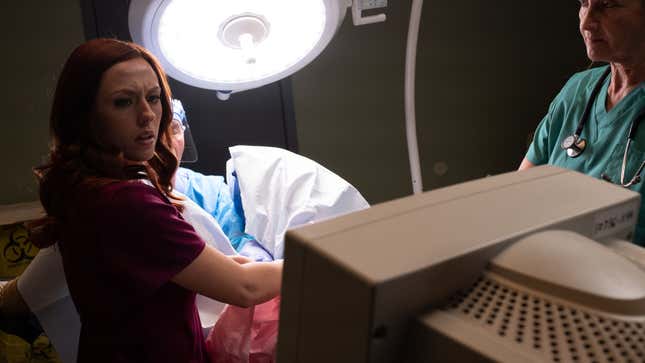

It is hard to make a movie when the world is out to get you. “We couldn’t get music for the movie, no one was taking our ad dollars, social media,” Cary Solomon, one half of the writer-director team behind Unplanned, explained in an interview just a few days before the film’s March release. “It is a conspiracy, and I will say that the left is very, very good at doing this sort of thing to get their agenda promoted. They punish those who go against them.”
The left and secular media were not the only forces conspiring to hold the movie back: There were also “over a dozen car accidents where the cars have been ripped to pieces or rolled over by a truck,” Solomon said, alluding to more Mephistophelean obstacles.
Despite an apparent plague of near-fatal incidents and media treachery, the creators of Unplanned—which tells the story of Abby Johnson, a former Planned Parenthood clinic director who went on to become a celebrity in the anti-abortion movement—made a profitable movie. Even in the film’s limited run, it’s now the Christian production house Pure Flix’s second-biggest release behind 2016’s God’s Not Dead 2, bringing in more than $6 million in its opening weekend and expanding to hundreds more theaters. There have been theater buyouts and ticket giveaways, often done in coordination with churches and anti-abortion networks, and even an invitation to Washington, D.C. (The film’s other writer and director, Chuck Konzelman, recently testified before Congress, where he claimed 94 clinic workers had, after watching the movie, reached out asking for help leaving the industry.)
Unplanned managed to sell tickets off the strength of its underdog narrative, endorsements from senators and the vice president of the United States, and a healthy assist from a rumored Twitter conspiracy and mainstream television networks’ general refusal to touch abortion-related advertising content.
Still, the theater I went to on a Thursday afternoon in early April was mostly empty (as most daytime screenings on a weekday are), save for four older people who each arrived and sat alone. After a series of trailers that oscillated between godly devotion and maximum teen horniness, the movie started with narration from Johnson, played by Ashley Bratcher: “My story isn’t an easy one to hear,” she tells the audience. “I think I probably ought to warn you of that upfront.”
-

-

-

-

-

-

-

-

-

-

-

-

-

-

-

-

-

-

-

-

-

-

-

-

-

-

-

-

-

-

-

-

-

-

-

-

-

-

-

-








































